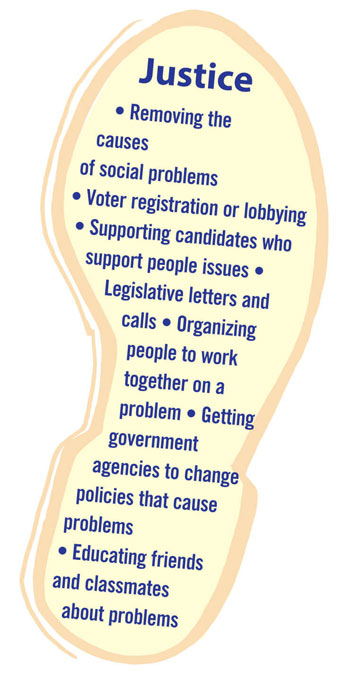Neither the just or the unjust in Sunday’s gospel parable have a clue when they have fed, clothed, or sheltered Jesus or neglected him. Both the just and the unjust have to ask, “When did we see you hungry or thirsty or away from home or naked or ill or in prison?”
Jesus’ answer calls us to minister to others. “As often as you did these things for one of the least of my brothers and sisters, you did it for me.” Jesus identifies himself with the poor, the refugee, the nerd, the airhead, the classmate who doesn’t know about deodorant.
Jesus also identifies himself with our friends, our parents, our brothers and sisters, our teachers, our coworkers. Jesus’ call extends to the relationships we experience every day. He calls us to treat all people with compassion and love.
How can we be sure we are among the just rather than the unjust? How can we be sure that we do all that Jesus asks of us?
There is no single, right way to go about doing the works of mercy. We can start by examining the way we treat the people we see every day such as our family and friends. These people may not be physically hungry or ill. Instead, the works of mercy call us to forgive them when they make us angry, listen to them when they feel lonely, and laugh with them when they are down.
Yet, Jesus is clear that we also must minister to the least in society. Some people choose to volunteer at homeless shelters or food kitchens. These types of actions fall under the category of charity. Charity addresses an immediate need such as feeding a hungry person, when he or she is standing before us hungry. Charity directly serves the needs of an individual or group.
Some people choose to host hunger banquets or write legislation to aid hungry people. These actions fall under the category of social justice. Social justice addresses the root cause of a problem and attempts to change that cause.
Charity that directly helps people makes us feel good. Justice that directly challenges the way we live our own lives may make us feel uncomfortable. Because social justice calls us to question why people suffer, it can be more difficult than charity.
It can be easier to give away old clothes that I don’t like to a thrift store than to try to stop buying the latest fashion when I really don’t need it. It can be easier to spend one day a week serving food at a shelter than to be sure I don’t waste food. It can be easier to visit the neglected than to right the relationships I neglect in my own life.
In Sunday’s gospel, Jesus calls us to follow him with both feet — the foot of charity and the foot of justice.


